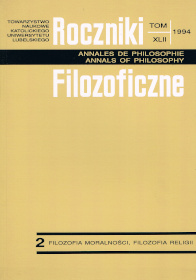May one "Lie from the Necessity"?
Abstract
Though a lie is usually considered as an evil, quite often a moral approbation achieve cases of the so-called "lie from the necessity", when subject is convinced, that lie serves as an end to a goal. It is enough to mention the lie in defense of a secret or lie to defend one's life.
The question of the moral appraisal of acts, where the means have been chosen to achieve an end, was carefully analyzed by St. Thomas Aquinas, and his doctrine is a basis for this article.
St. Thomas's analysis of human acts proves that the mean (finis operis) chosen by the subject to achieve the goal (finis operantis) is neither morally indifferent, nor justified by the end itself. St. Thomas however permits actions, that bring about both good and bad effects but only when the means chosen for an end are within the proportional reason. It reason is proportional when there is no less harmful way of protecting the value here and now, therefore both means and the end must be proportional to the ultimate end. This condition never complies with the lie (cannot be referred to the lie), so St. Thomas allows here only a prudent concealing of truth, but unfortunately he doesn't explain how he understands it.
The prudent concealing of truth cannot negate the value of truth. It occurs when the good of the others demands the manifestation only part of the fact. The concealing of the truth can be immoral if some is called upon to be a witness.
Especially difficult are those situations, where one is forced to unveil information to bad ends. Even the threat of death cannot justify the lie, though one must admit, that the guilt of the man who is lying in an especially difficult situation is different from the guilt of man who lies for some material benefit.
Copyright (c) 1994 Roczniki Filozoficzne

This work is licensed under a Creative Commons Attribution-NonCommercial-NoDerivatives 4.0 International License.





